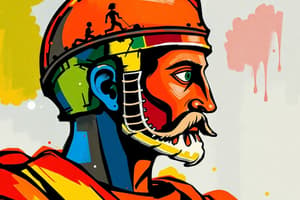Podcast
Questions and Answers
What changes did Augustus make in Rome's political, military, and social institutions?
What changes did Augustus make in Rome's political, military, and social institutions?
Fixed term of service: 16 years at first, then from AD 6 20 years. Creates vigiles: 7 cohorts, made up of freedmen, in charge of various functions around the city, e.g., fire, policing, etc.
What were the chief features of the Roman Empire at its height during the second century?
What were the chief features of the Roman Empire at its height during the second century?
The empire was ruled by increasingly powerful, although not always effective, Caesars. Frontiers were firmly stabilized and protected.
What were the chief intellectual, artistic, and social developments in the early Empire?
What were the chief intellectual, artistic, and social developments in the early Empire?
Virgil, Horace, Ovid, and Livy were some of the great literary intellectuals who wrote about Roman history, new Roman values, and love during the golden age of Latin literature.
What political, military, economic, and social problems did the Roman Empire face during the third century?
What political, military, economic, and social problems did the Roman Empire face during the third century?
What characteristics of Christianity enabled it to grow and ultimately to succeed?
What characteristics of Christianity enabled it to grow and ultimately to succeed?
How did changes in the composition and character of the Roman military affect the Roman Empire?
How did changes in the composition and character of the Roman military affect the Roman Empire?
What does the title 'Augustus' mean?
What does the title 'Augustus' mean?
What role did Octavian assume after giving up the office of consul in 23 B.C.E.?
What role did Octavian assume after giving up the office of consul in 23 B.C.E.?
Was the praetorian guard a bodyguard for the Senate specifically?
Was the praetorian guard a bodyguard for the Senate specifically?
Under Augustus, the equestrian class was contracted, limiting opportunities for citizens not of the senatorial class or lower classes?
Under Augustus, the equestrian class was contracted, limiting opportunities for citizens not of the senatorial class or lower classes?
Dear Flavius, My father used to tell stories of our family's ancestors, who lived in the time of Julius Caesar. Then power derived from _____.
Dear Flavius, My father used to tell stories of our family's ancestors, who lived in the time of Julius Caesar. Then power derived from _____.
My father also told me stories of the ______ of that time that ended with the accession of Augustus.
My father also told me stories of the ______ of that time that ended with the accession of Augustus.
Augustus saw his position as ______ and in that manner served Rome.
Augustus saw his position as ______ and in that manner served Rome.
Our recently deceased leader _____, who died last year, was one of the good ones.
Our recently deceased leader _____, who died last year, was one of the good ones.
When a madman like ____ is emperor, things can go horribly wrong.
When a madman like ____ is emperor, things can go horribly wrong.
Flashcards are hidden until you start studying
Study Notes
Changes Made by Augustus
- Augustus implemented a fixed term of military service, originally 16 years, later extended to 20 years by AD 6.
- He established the vigiles, consisting of 7 cohorts of freedmen responsible for fire-fighting and policing in Rome.
Features of the Roman Empire in the Second Century
- The Roman Empire was led by powerful Caesars, whose effectiveness varied.
- The frontiers of the empire were well stabilized and protected.
Intellectual and Artistic Developments
- Prominent figures of Latin literature during the early Empire included Virgil, Horace, Ovid, and Livy.
- These writers explored themes of Roman history, contemporary values, and love, contributing to the cultural flourish of the golden age.
Crisis of the Third Century
- The period marked by the Crisis of the Third Century is also known as Military Anarchy or the Imperial Crisis, pointing to significant political and military turmoil.
Growth of Christianity
- Christianity emerged as an inclusive religion, appealing to a wide range of followers, which contributed to its growth and eventual success.
Changes in the Roman Military
- The military began to recruit the capite censi, or landless poor, altering its composition and impact on the Roman Empire.
Title of Augustus
- Octavian was granted the title of Augustus, meaning "the revered one," a preferred designation in light of Caesar's controversial dictatorship.
Octavian's Political Role
- After resigning from the consulship in 23 B.C.E., Octavian took on the roles of Princeps and Tribune, central figures in Roman governance.
Role of the Praetorian Guard
- The praetorian guard served as bodyguards for senior Roman legion officers rather than for the Senate.
Equestrian Class Dynamics
- Contrary to limitation claims, the equestrian class under Augustus was not contracted, preserving opportunities for non-senatorial citizens.
Historical Reflection
- Power in ancient Rome shifted from collective Senate control to an imperial system, influenced by family history and civil wars.
- The loyalty of soldiers increasingly shifted to individual generals due to land concentration among the elite.
- Augustus positioned himself as a servant to Rome while laying the foundation for the imperial structure.
- Reflections on past leaders suggest a complex relationship with power, exemplified by Marcus Aurelius and left with concerns about figures like Nero.
Studying That Suits You
Use AI to generate personalized quizzes and flashcards to suit your learning preferences.




